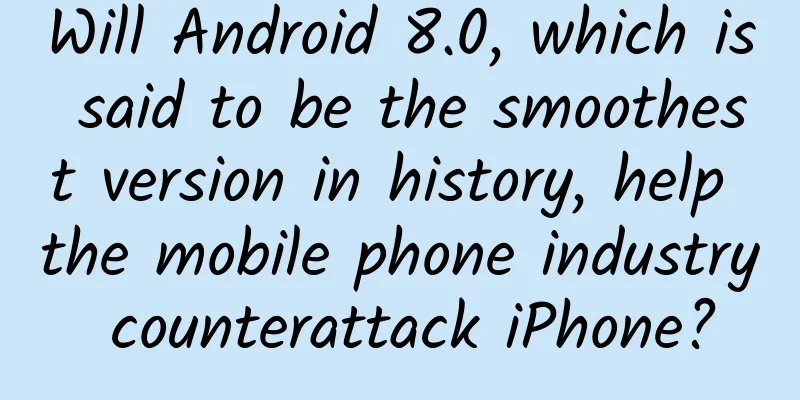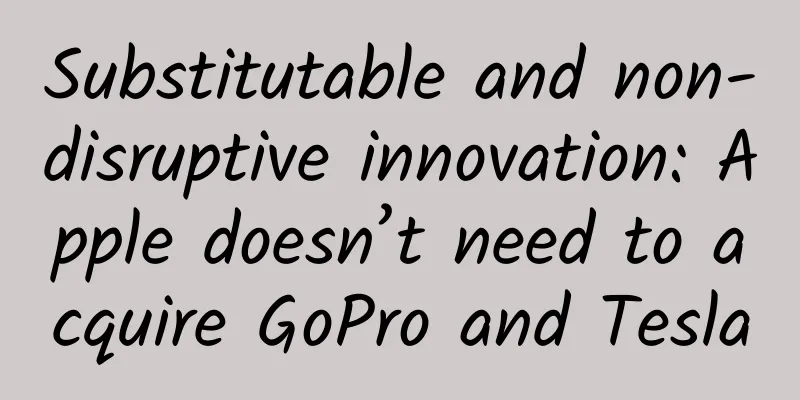Will Android 8.0, which is said to be the smoothest version in history, help the mobile phone industry counterattack iPhone?

|
In recent years, the competition among smartphone systems has intensified, with the open Android competing against the closed IOS. By the end of 2014, Google Play had suppressed the App Store's 1.43 million applications with 1.27 million. According to APP Annie's statistics this year, after including China's third-party stores, the revenue of the entire Android system will also surpass that of the App Store. However, considering the 5:1 numerical advantage of Android devices, this is not a particularly dazzling result. The per capita contribution of IOS users is still higher. According to a survey by Sensor Tower, last year American iPhone users spent an average of $40 on apps or in-app purchases, a significant increase from $35 last year, and about 75% higher than Google Play. Although Android phones have an absolute advantage in number, their user experience has long been inferior to that of iPhones. This is largely due to some insurmountable inherent flaws in the Android system. The first is excessive consumption of system resources. There are many theories about the background work mechanisms of Android and Apple. In essence, each has its own advantages and disadvantages. Although the Java memory management and recycling mechanism of the Android system speeds up the opening of applications, too frequent access also causes lag. In terms of user perception, the iPhone is the winner. To solve this problem, Android abandoned Davik from 4.4 and launched a new application environment ART, which not only supports just-in-time compilation but also supports pre-compilation, which reduces energy consumption and improves battery life, but the problem has not been completely solved. The second problem is serious fragmentation. Open Signal concluded in 2015 that the fragmentation of the Android system has doubled in two years, as reflected in the complexity of devices, the proliferation of brands, different resolutions, and the fact that many manufacturers are fighting each other and conducting in-depth customization separately. The huge differences in hardware and kernel have led to many compatibility issues, increased development difficulty, and the failure to form a unified ecological environment. The complete open source and free nature of the Android system has caused Google to lose its dominance over the Android system. But the blame still has to be borne by the mobile phone manufacturers. In 2015, Open Signal randomly checked 682,000 Android devices and found that there were 1,294 manufacturers behind them, resulting in extremely complex Android system versions. This means that some devices are running Android 4.4, and even a very small number are still running Android 2.3. Only a small number have been upgraded to 5.0, which was released long ago. Since there are many devices involved and a large number of adaptation issues arise, supporting system updates for existing users is not the first choice for mobile phone manufacturers. In comparison, Google's own Nexus has not received so many complaints. What exactly does Android 8.0 solve? The Google Developer Conference in May 2017 will be held in Mountain View, California, where Android 8.0 will be officially released. This new system has already appeared, codenamed Android O, and the actual release time may be in the third quarter of this year. For this system, people are not concerned about whether the 3.5mm interface will become history, but how this system can achieve the smoothest operation in history. Now it seems that Google has focused on strengthening background management, limiting push notifications, turning on the "Allow unknown sources" switch when installing apps, and focusing on improving system security, especially for apps in the whole family. Other improvements include reclassification of interfaces, Copy less cross-program text copying and pasting, gesture functions, picture-in-picture, etc. However, there are many anti-scientific claims in the publicity, such as emphasizing that the fluency has increased by 5 times. What is the quantitative basis? Everyone knows that the shortcomings of the Android system have always been not the short-term experience, but the fluency after long-term use. So some netizens joked that when Android 5.0 was released, it was claimed that its fluency was equivalent to IOS. Later, it was claimed that 6.0 was 3 times faster than 5.0, and 7.0 was 6 times faster than 6.0. In total, Android's fluency is already 18 times that of IOS. Don’t forget, Android 8.0 has improved by 5 times this time, and IOS seems to be in big trouble. What are the prospects for competing against iPhone? Many people are looking forward to the ultimate showdown between Android 8.0 and IOS11, which will reverse the system disadvantages of Android phones. Regardless of the outcome, the occurrence of this scene depends on two prerequisites. The first is the attitude of many mobile phone manufacturers. Because mobile phone manufacturers have never been enthusiastic about system updates, a large number of Android devices are still at the Android 4.4 and 5.X level. The occasional adoption of Android 6.0 can be used as a gimmick for publicity. Even a considerable number of users think that the Android system updates too quickly. As of March this year, the installation rate of Android 7.X was only 2.8%. In contrast, although the update rate of new IOS versions has been declining, IOS10.0, which was released in September 2016, had a market share of 63% by December, which is much higher than the update rate of the Android system. Except for Huawei's intention to use Android 8.0 to support Mate 10, the enthusiasm of other manufacturers is also questionable. Generally speaking, the flagship models of manufacturers will be updated faster, and the mid-range models will only be updated once every one or two months to fix bugs. Due to the large number of low-end devices, manufacturers have no motivation to adapt. In theory, the more modifications and customizations manufacturers make to the underlying system and UI, the fewer developers they are willing to spare to solve the problems. But the most fatal level is still the application level. The Android system grants third-party applications great permissions based on its mechanism, and these permissions are often abused. The phenomenon of applications requesting super authorization is very serious, and they cross the line to read information such as location, address book, call logs, text messages, etc. This is the culprit for mobile phone freezes, and this phenomenon has never been effectively eradicated. In the absence of Google's action, some mobile phone manufacturers have begun to exercise self-discipline. For example, Huawei has joined forces with Internet companies such as Tencent, Alibaba, Baidu, and NetEase to establish the Android Green Alliance, attempting to solve some inherent problems of the Android system by combining software and hardware. The alliance has drafted and formulated five major standards: compatibility, stability, performance, power consumption, and security. However, the initial certifications were all for some hero apps, which left people with some doubts about the actual role of the alliance. In the eyes of some mobile phone manufacturers, Huawei wants to be the rule maker of the Android system and use certain technical specifications or solutions to restrict other friendly companies. However, its real purpose may not be simple. Other independent apps that are doing well suspect that this alliance is a disguised way of endorsing the security of apps owned by large companies, and they worry that their own market position will be marginalized. Although Android 8.0 is the most important update in recent years, it will be a long process for the Android phone camp to challenge the iPhone, and the competition has just begun. As a winner of Toutiao's Qingyun Plan and Baijiahao's Bai+ Plan, the 2019 Baidu Digital Author of the Year, the Baijiahao's Most Popular Author in the Technology Field, the 2019 Sogou Technology and Culture Author, and the 2021 Baijiahao Quarterly Influential Creator, he has won many awards, including the 2013 Sohu Best Industry Media Person, the 2015 China New Media Entrepreneurship Competition Beijing Third Place, the 2015 Guangmang Experience Award, the 2015 China New Media Entrepreneurship Competition Finals Third Place, and the 2018 Baidu Dynamic Annual Powerful Celebrity. |
Recommend
Mid-Autumn Festival Special: I want to go home and see ____!
Traveling across the world See the vast world But...
The super moon will appear! Come and see it tomorrow night
Poster production: Feng Juan According to astrono...
If you could take an elevator to space, would you dare to try it?
According to Science and Technology Daily, at the...
Why do I want to laugh when others laugh?
Planning and production Source: A Brief History P...
Why does ofo invest in advertising while Mobike does public relations?
To date, ofo and Mobike have been fighting for ne...
How were games developed 20 years ago?
[[145405]] Someone asked on Zhihu: "There ar...
Scientists took a panoramic picture of the black hole that humans "saw" for the first time!
Produced by: Science Popularization China Author:...
Marketing promotion plan for the May Day event!
Labor Day is coming soon. Have you thought about ...
High conversion community operation skills
" Community operation is the most tiring job...
It’s 2022, why can’t humans eradicate cholera and plague?
In our country, although cholera occurs every yea...
Earn 50 yuan in half an hour, try the monetization ability of PPT! How much does it usually cost to make a PPT?
It's a new week. I believe many people check ...
Can eating chili peppers often help you live longer? A meta-analysis of 570,000 people in four countries including China and the United States
In recent years, many studies have shown that chi...
[Smart Farmers] It’s hot, hot, hot! Here’s a “heat-proof cooling patch” for you
What is heat stroke Heatstroke is a general term ...
Galaxy S6 Edge vs iPhone 6 drop resistance comparison: Apple is shocked
Galaxy S6 Edge is already on sale overseas, and f...
As 5G technology matures, can it help accelerate the implementation of blockchain?
2019 has become a hot spot for the development of...









